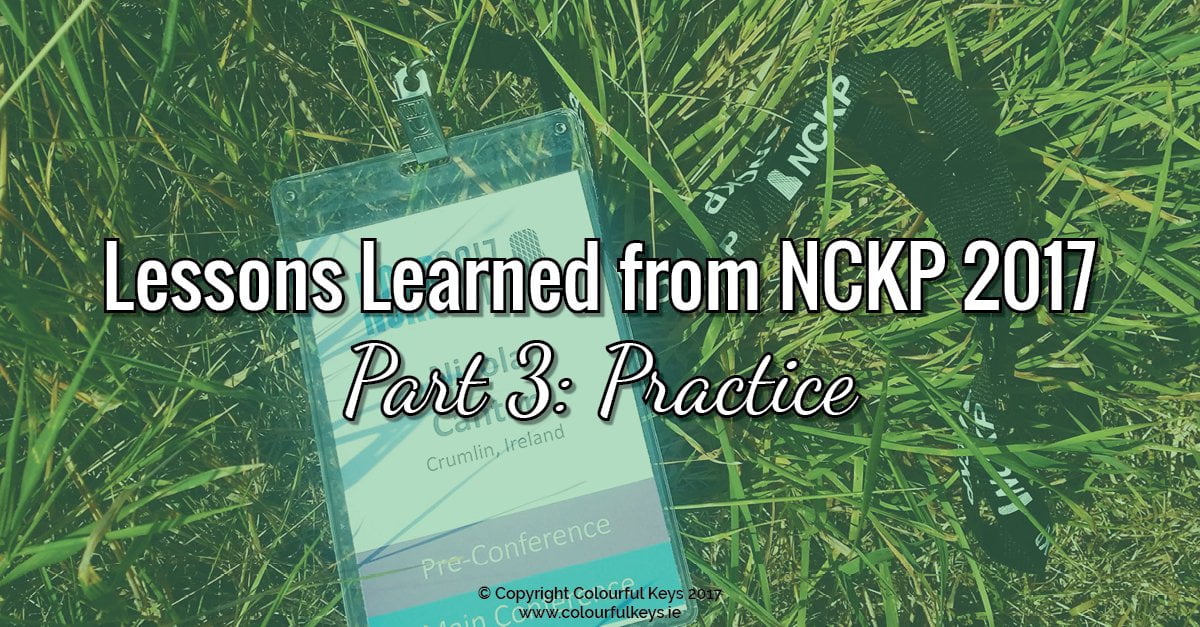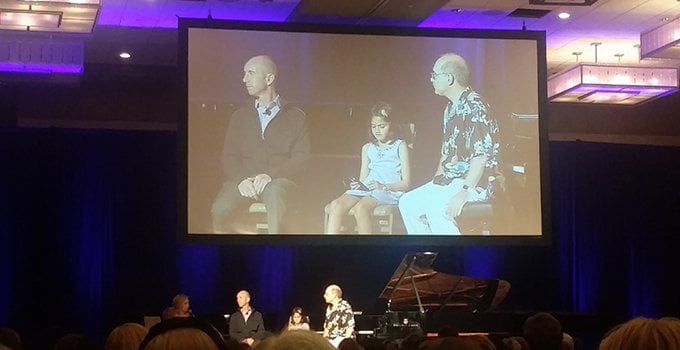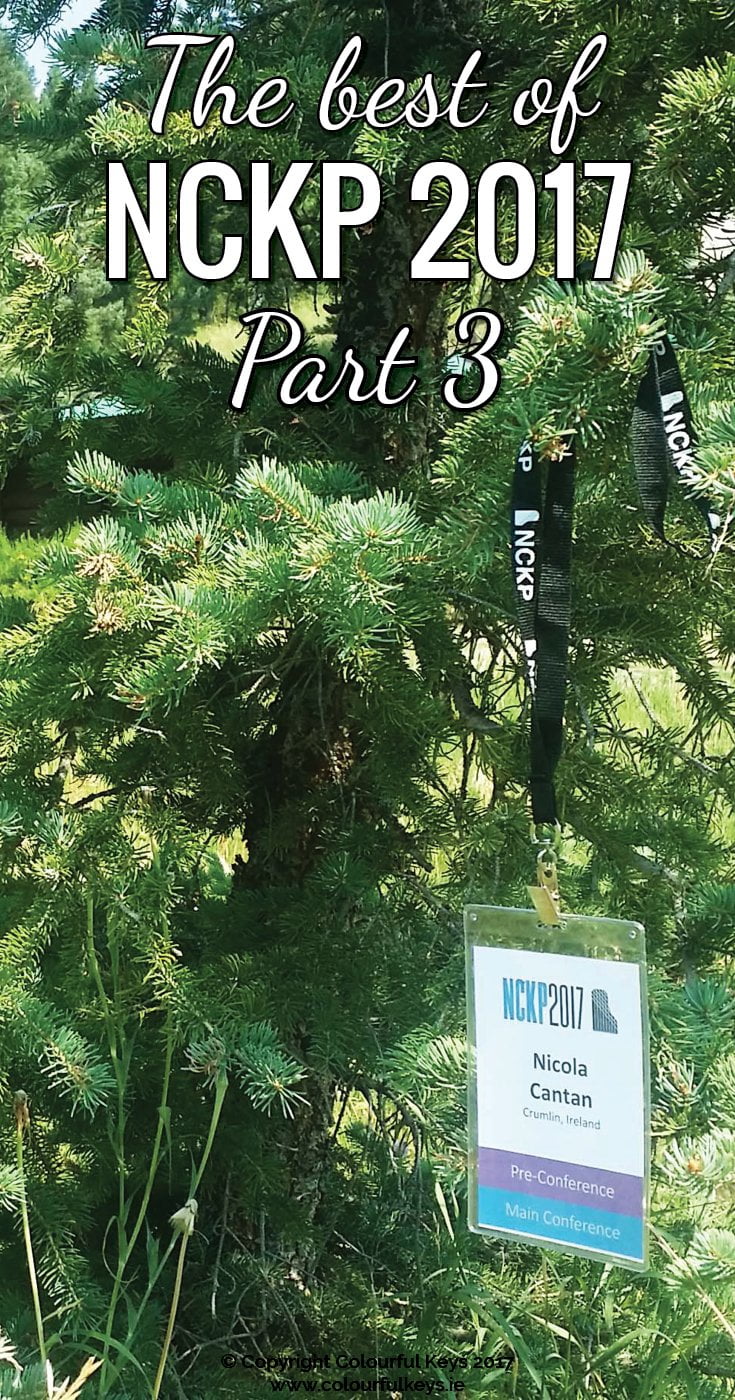During one of the teaching demonstration discussions on the second day of NCKP 2017 Robert Duke told a story of a student teacher. The teacher was complaining to Robert that week after week, her student would come back not having practiced at all…
She asked Robert what she was supposed to do in this situation and he said:
“Stop teaching them as if they practiced.”
This plays on a theme that I saw throughout every area of this conference, you have to teach the student as they are in the moment, and simultaneously be proactive about how they will be in the future.

Who’s driving this thing?
It can be too easy as a teacher to fall into the trap of reacting to what a student comes in with – and we do need to be flexible. But we also have a responsibility to stay in control of the ship.
Students don’t know where they’re going, so only we can plan the route.

In the final session of NCKP 2017 we had the absolute pleasure of watching Marvin Blickenstaff teach. I found his explanation of his lesson preparation rather intriguing.
He makes out the assignment sheets before each lesson, and then uses this as a roadmap during the lesson – not to follow to the letter, but to give him an idea of where they’re going. If they don’t get to it during the lesson, he simply crosses it off the assignment sheet.
This is a small distinction but I think it reveals his years of experience, as well as how clear he is about his long-term plans for each student.
Marvin also said that he plans the repertoire and assignments so that his student can accomplish something tangible each week. If a piece is stagnating from one lesson to the next – he feels like he’s made a mistake with his repertoire choice.
I Really Mean It
In day three’s teaching demonstrations Courtney Crappell probably did the best job of presenting just as it would be in his studio. He set up his laptop on the piano so we could see how he referenced the notes from the previous lesson, and the lesson format we would be following.
The thing that I really enjoyed about his session was that he started by checking in on several trouble spots she had been practicing since the last lesson. This shows a child that you really mean what you say.
Instead of moving on to the important business of new repertoire, or just asking how it went, he heard each of these sections until he could see if the issue was fixed or not.
These little check-ins really only took a couple of minutes, but it meant he was able to go straight back into the complete piece knowing they could work on new areas and ideas – without getting bogged down in previously covered details.
All Aboard the Practice Express
In Christy Vogt-Corley’s session about the Suzuki philosophies that we can carry through into reading based teaching, she spoke about the parents’ role in piano studies.
In the Suzuki method, parents are the ones who take lessons for the first 4-6 weeks. They then act as a practice coach for the student at home.
So what can we do if we can take this kind of intensive approach?
Christy suggested having the parents in the lesson for at least the first year of lessons. Courtney Crappell also mentioned that he insists on parents being present for the first two years of lessons, and Jani Parsons said that her piano parents are in a waiting room – but that she regularly calls them in to observe a particular technique or strategy.
We say this again and again – students just cannot practice by themselves at such a young age. The ones who excel are those whose parents understand their role in the practice process.

Practice Specifics
Overall, it was great to hear practice talked about in such specific terms. Although I didn’t make it to any sessions about practice – I appreciated to focus on this important topic throughout the conference.
As you might be aware from my book and course, this is something I feel very strongly should be covered more.
Is this all stuff you’ve heard before? Did you find a new way to look at practice from these wonderful pedagogues?
Tell me about it in the Vibrant Music Studio Teachers group on Facebook – I’m always happy to chat practice, progress and planning.

Hey Nicola,
It’s great to read your thoughts. Unfortunately, I was working registration during Courtney Crappell’s teaching demonstration. I would have liked to have gone!
Your thoughts bring up something I’ve been thinking about a lot lately. First, as you said, Marvin does make an assignment sheet for every student before the lesson. He and I work together at the New School for Music Study, and it is actually a rule there that assignment sheets must be prepared in advance. Frances Clark believed that it saves precious minutes, and it truly does, as uncomfortable as it might be to decide an assignment before hearing what happened that week. Now I must make sure this happens for all of my students outside of the New School as well!
What you said about Courtney Crappell’s teaching is interesting though. This is the way I instinctively teach. After all, how can we decide what new pieces a student will learn (or how many) before we’ve heard what they’ve done for the week? And yet, as you said with Robert Duke’s quote, a lesson should reflect how a student practices during the week. So the traditional lesson format then sends the message that a student should begin practice with issues in review pieces, and only then proceed on to new pieces. Unfortunately, this means that a student only looks at new material when their brainpower has been exhausted.
This past week, I’ve been focusing in my planning on making sure that I introduce new material at the BEGINNING of the lesson (well, I like to do technique first), when the student’s mind is freshest. This also models how the student should practice. If you think about it, a misunderstanding of a concept is really best reworked in the context of a new piece. For example, if a student doesn’t *get* staccato, it’s not going to help to take a piece that was practiced legato (or non-legato, more likely) for a week and try and re-mold it into a staccato performance. It’s smarter to prepare concepts with in-lesson only activities in advance, and to make the concept a central issue in the introduction of a new piece. Now that I write this, I have to admit I really messed up with a student this past week. Oh well, thank God for next week!
By moving new music to the beginning of the lesson instead of the end, I think we shift ourselves from “reactive” pedagogy, to “preventative” pedagogy. This is where the gold is: anticipating issues and acting before they occur, not after a student has practiced them in for a solid week. Now, that’s not to say that reviewing music isn’t important. I think you learn after a few weeks just how large a new assignment you can give and still have time in the lesson for review pieces.
Thanks for reading my thoughts. I’m curious to hear what you think.
Thanks for your thoughts Jason. Every time I looked over you seemed to be at the booth, I hope you got to see some fun stuff too?
You bring up such interesting points, and as I was reading I was mostly bringing to mind my partner lesson teaching. I prepare their assignments in advance, do new stuff often first thing, etc, etc.
You have me resolved to try making my solo lesson time look more like my partner lesson time does – this will be an interesting experiment for sure! I’ll have to get back to you when I’ve tried it all out. I possibly feel a blog series brewing as I think about the experiment. 😉